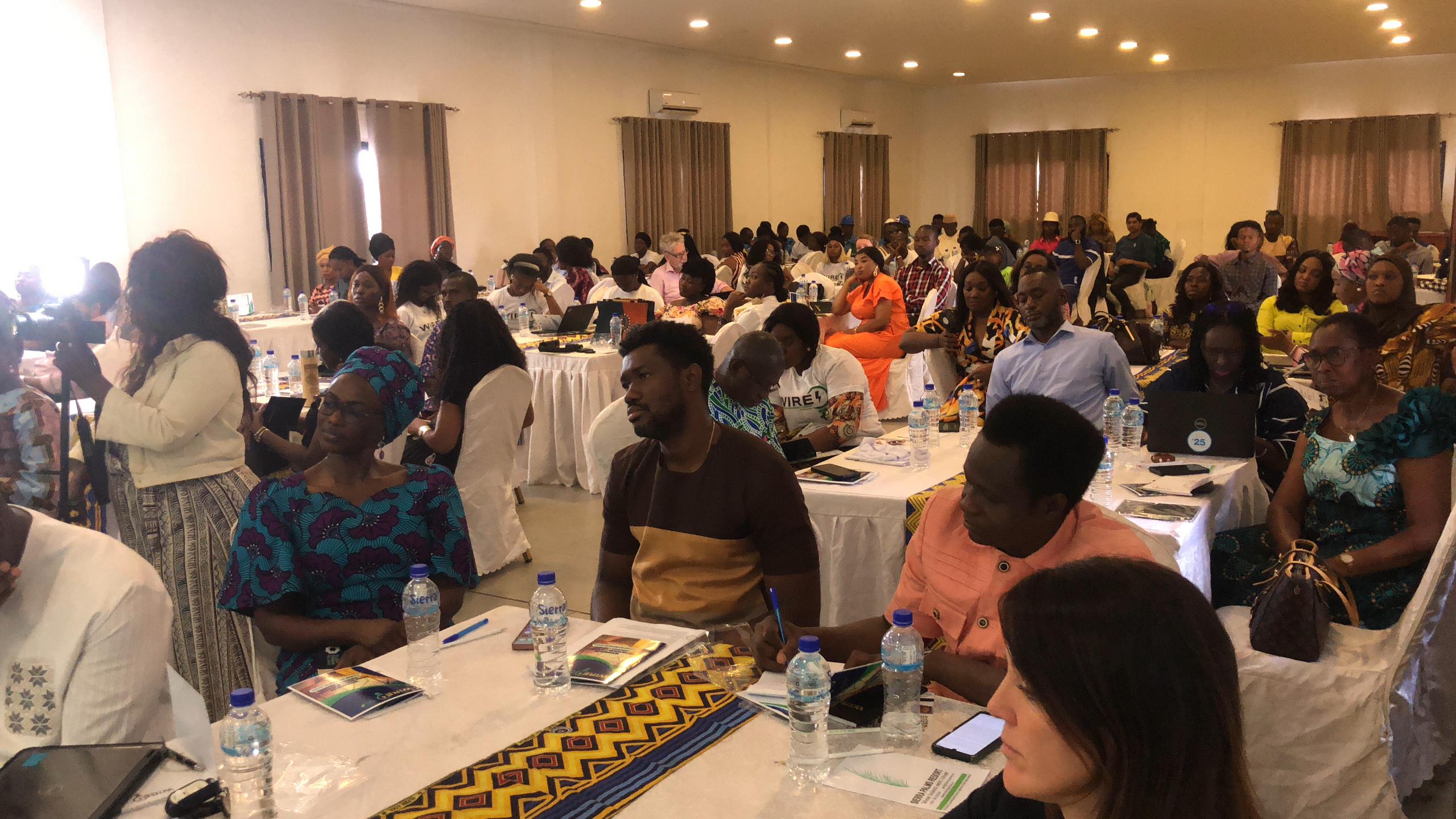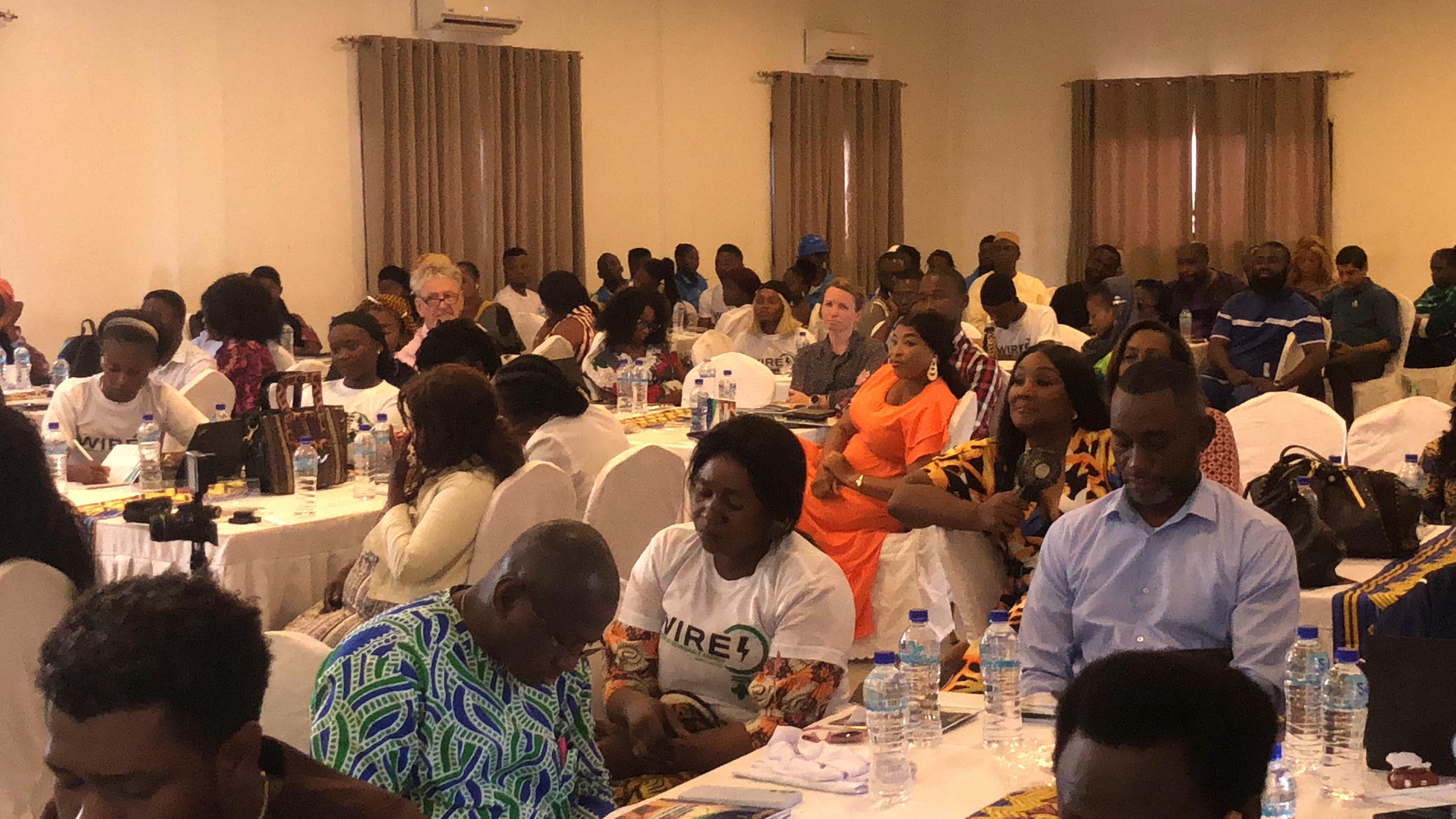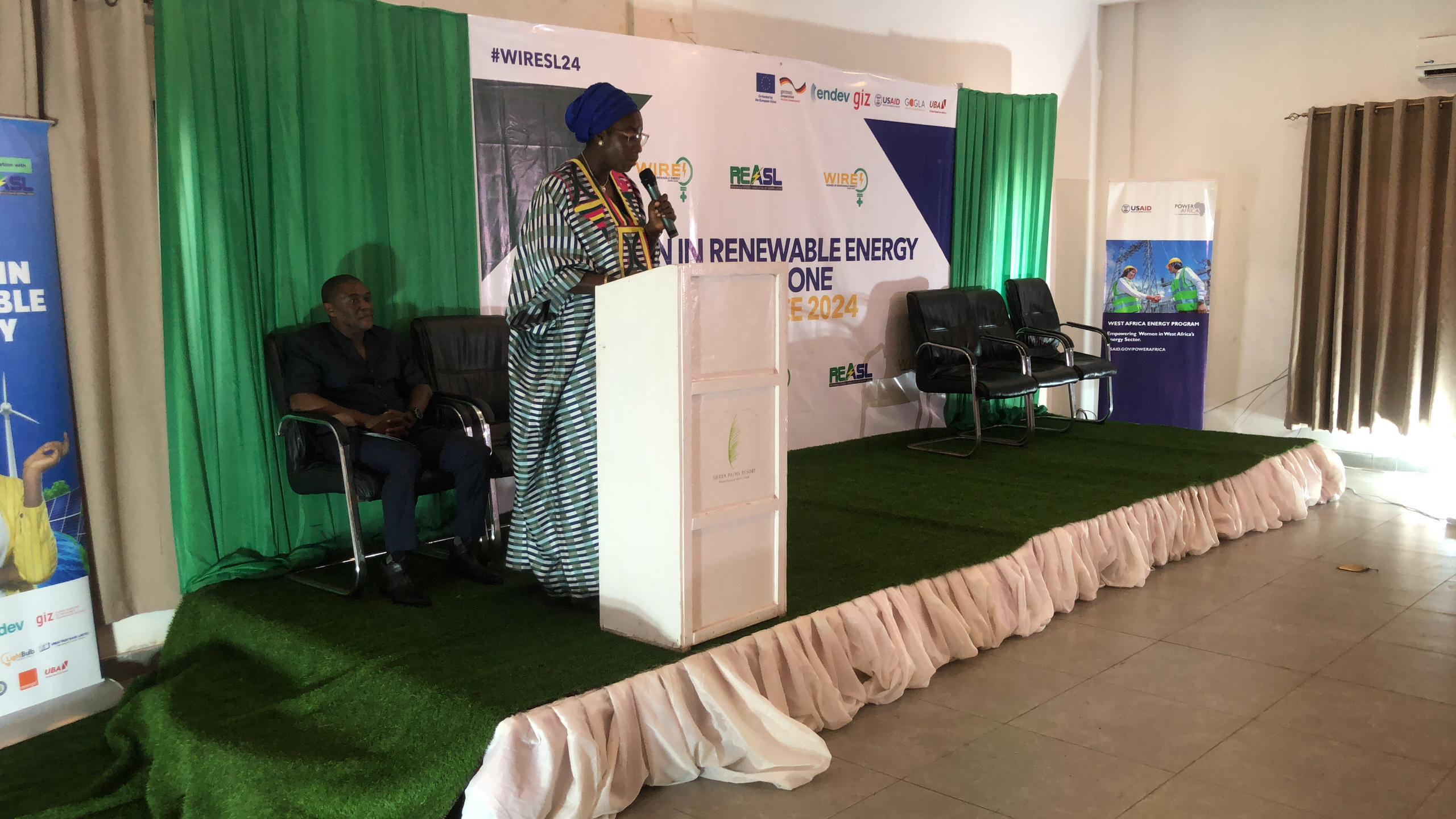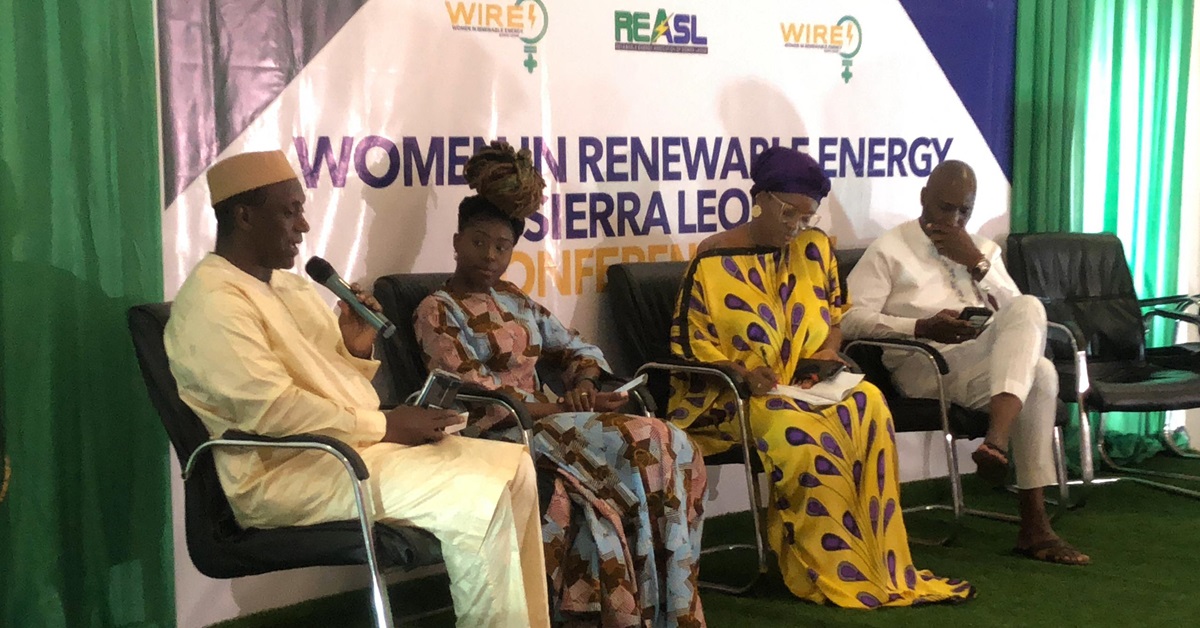One of the leading telecommunication companies in Sierra Leone, Orange Sierra Leone partners with Women In Renewable Energy (WIRE) Sierra Leone to host a ground-breaking women’s renewable energy conference at Sierra Palms Hotel.
The conference features a host of delegates who have showcased their might in the field of renewable energy. CEOs, parastatals, and honorable from the renewable energy sector in not just Sierra Leone but in Africa were present to share their knowledge and expertise about the role women should play in the sector.

As a support to women’s empowerment and a push toward President Bio’s Big Five Game Changers, Orange Sierra Leone joined other partners to grace a laudable event that interested many renewable energy companies and entrepreneurs.
The event showcased the challenges faced by women in the industry and provided inspiration for a more inclusive and diverse future.

In her keynote address, the National Coordinator SLCDU, Mrs. Adeku Ufere shared her personal journey and highlighted the importance of women’s participation in renewable energy. She emphasized the need for equal opportunities and representation for women in the sector.

She furthered showcased her commitment towards the fight for women’s participation in renewable energy highlighting what she see looking at the audience.
“When I look around this room, I see potential, I see energy, I see talent, I see creators… the fuel for the economic transformation that Sierra Leone so desperately craves. If we make the mistake of not cultivating the abundant resource that women are uniquely placed to deploy through equal and equitable access to economic activities, we may mark another missed opportunity for Sierra Leone’s economic take off. In my view, the stakes are too high for essential sectors such as the energy sector to not have a clear vision and strategy to harness the capacity of women to meet its energy transition objectives. Within this framework of energy transition, economies across the globe are seeking to increase consumption of energy from renewable sources such as wind and solar. In the context of Sierra Leone, a commitment to a just energy transition is critical to meeting our national development aspirations and global benchmarks,” she said.
She continued her speech by showcasing policies that should be set for women’s participation in the renewable sector. She said,” In the specific case of Sierra Leone, there is a real opportunity now to leverage the just energy transition roadmap that is being developed by Government to entrench the role of women as agents and partners for energy transition. I will say it again, we have a real opportunity to frame the conversation differently and drive tangible transformation in Sierra Leone by prioritizing the efficient and effective use of all resources available to us by making deep structural changes to our energy workforce both in the public and private sectors. What I mean by this is that we should have an explicit goal to make the face of Sierra Leone’s renewable energy sector female.”
In her quest to called on the audience to studies that have proved the importance of women’s inclusion in the energy sector, she accentuated that there are other downstream benefits of women in leadership that are relevant to the industry such as the findings from a 2020 study by the Peace Foundation which revealed that where women made up above 30% of a company’s Board, the growth rate of emissions was just 0.6% as compared to 3.5% by Companies with no women on their board.
“At the nexus of gender and renewable energy vis-a-vis the drive for just energy transitions lies an opportunity to re-engineer the participation of women across the energy value chain to catalyze economic transformation for emerging economies such as Sierra Leone,” she said.
At the end of her speech, she called on all women to stand up now more than ever as the platform for development is created by other strong women in that sector.
“I think we can all agree that the development of Sierra Leone is inextricably linked to unleashing and nurturing the talents, energy and innovative capacity of its women. The time is now, it’s this moment and its conversations like this that we hope will spark the transition to a future that looks very much like this room because it is the surest way to build inclusivity, sustainability, and equality in our development,” she ended.
Adaku Ufere, the Chief of Party for the USAID-funded Power Africa West Africa Energy Program echoed her sentiments toward women’s participation in renewable energy stressing the critical role women play in driving innovation and sustainability in the energy field. she expressed some powerful words that were inspiring to the attendees breaking barriers and paving the way for future generations of women in renewable energy.
She showcased how women’s participation in the field would create limelight for vast improvement in the sector.
She highlighted the inclusion of women in the renewable energy sector would not only enrich the field with diverse perspectives but also catalyst for innovation and heightened return on investment.
“We know women are most impacted by the repercussions of climate change, which further exacerbates gender inequalities. But because of these experiences, women bring unique viewpoints, problem-solving skills, and leadership styles into the sector, that can drive creative solutions and lead to more innovative outcomes. Power Africa not only understands this need but reinforces it as a cross-cutting theme across all of its workstreams and as standalone projects, creating boundless opportunities for women to participate as vital actors in the energy sector. We believe that empowering women is not just a moral imperative but also a strategic one for the energy sector’s success,” she said.
The Chairman of the Presidential Initiative on Climate Change, Renewable Energy, and Food Security, Dr Kandeh K. Yumkella in his address expressed his presence as an honour to grace the event. He said the program is the beginning of the mobilization expressing his feelings about the momentum toward the fight for womanhood.
“I see the women now highly interested in climate change and energy issues and yes they are role models. In some other countries, it is hard to find them but I see them I know them,” he lamented while expressing his astonishment at the speech from the keynote speaker.
He expressed his recognition of how women CEOs, Entrepreneurs, and Leaders have been so knowledgeable about energy issues and bring solutions to the trade.
“We need to see more. The policy environment should be created and that’s where we come in,” he stressed.
He went on to say that they are working on an energy transition plan and it is now they have just presented where they are so far after four months of working on it and should be finishing it by the end of May/June. He hoped that the keynote speech would reflect the just concluded Energy Transition Plan which will be a plan for 10-20 years so that these issues are already embedded in it.
He said that talking about women’s Economic empowerment without involving energy solutions is a joke stating the reason agriculture is the mainstay in the country and that 60% of our GDP depends on it, and also 70% of our employment comes from agriculture.
“In agriculture, most of the activities after the products are harvested are all managed by women, with their hands, and feet, they are providing the root energy that is needed and in the process, they get sick. Like rice for example, which I said in the media, gives you an idea of what I mean,” he said.
He called on Ministers to visit the provinces so that they would see what women meant to the economy. He said all the processes after harvesting the rice are done by women and those are energy. He said all of those processes of pounding, wallowing, parboiling etc should be done by technology but are championed by women and those are energy.
He ended by saying that 80% of value addition is done by women, so Feed Salone cannot be achieved without being conscious of the technology needs of women.
“ We cannot achieve Feed Salone if we don’t provide those solutions along the value chain. We need institutional requirement, policy requirements, data to documents which are all about awareness, mobilization and organizing women. I see women coming together my job is to back them,” he ended.











